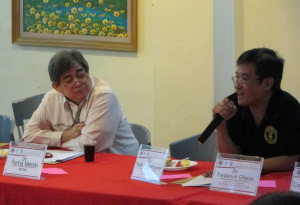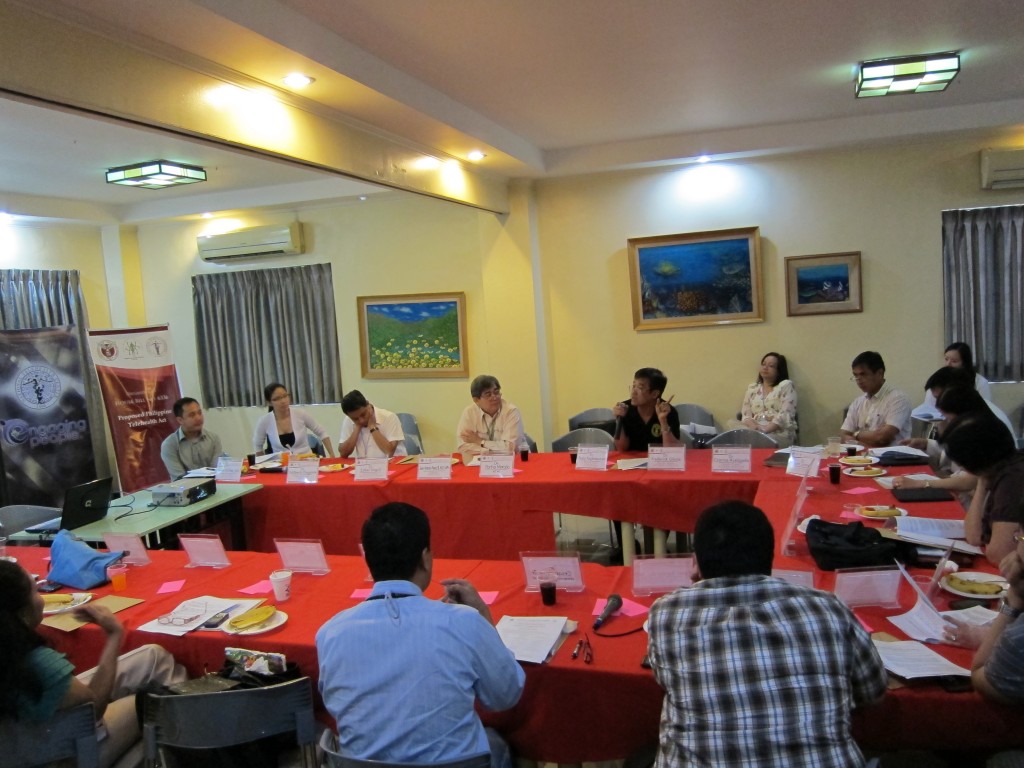Telehealth Bill to Regulate Practice in PH
June 21, 2012 1:36 pm | by Aliyah Lou Evangelista | Posted in News
Manila, Philippines- Congressman Joseph Emilio Abaya, LP, a staunch health and information and communications technology (ICT) advocate in the congress, filed a bill to push for the “Telehealth Act of 2012”. The bill will regulate telehealth in the Philippines and set standards for its safe and ethical practice.

Dr. Ramon Paterno of the National Institutes of Health, sharing his insights on the bill. On his left is Dr. Jose Antonio Perez III, Director of Bureau of Local Health and Development of the Department of Health..
Also known as House Bill 6336, the bill will strengthen Department of Health (DOH) Secretary Enrique Ona’s commitment to provide telehealth services to at least 606 poorest municipalities in the Philippines.
It will also help in aligning plans “for attaining efficiency by using ICTs in all aspects of health care”, one of health policy directions described in Ona’s Universal Health Care agenda.
Abaya, who supports efforts in providing medical expertise especially in isolated and medically underserved communities, initiated a similar bill in 2009 when he was still Co-Chair of the Congressional Commission on Science & Technology and Engineering (COMSTE). The bill, initially tagged as the “National Telehealth Service Act of 2009” will “benefit patients and medical professionals who can now use Internet technology to tap medical expertise”.
Both the National Telehealth Act of 2009 and the Telehealth Act of 2012 were founded on the National Telehealth Center’s (NTHC) 14 years of experience in telehealth.
NTHC, based in the National Institutes of Health, University of the Philippines Manila, is a leading research unit committed to improve health care through information and communications technology (ICT). It has been providing telereferrals to doctors in remote communities, conducting educational sessions for local health workers through videoconferencing, and implementing the Community Health Information Tracking System (CHITS), the award-winning electronic medical record for government health facilities for more than a decade.
NTHC, side by side with Abaya, is advocating support for the bill by generating this discussion both in congress and in the health care sector.
In a forum held yesterday at the University of the Philippines (UP) Manila, Dr. Gene Nisperos, NTHC coordinator for Telehealth Bill advocacy, described the slow but steady increase use of ICT in health in the Philippines. According to him, the various clinics and hospitals offering teleconsultations and using electronic devices for managing patient medical records prove how ICTs are revolutionizing activities for patient care.
The proposed act will help connect patients and doctors for medical consultation through ICTs. Nisperos noted the lack of clear legal and social guidelines to guide telehealth practice, ensure patient safety and preserve patient information confidentiality are issues that the act will battle with.
HB 6336 will spearhead creating the National Telehealth Board who will be responsible for crafting policies and guidelines on ethical and safe practice of telehealth in the Philippines. Under the bill, a corresponding National Telehealth Reference Center (NTRC) will be created to implement policies passed by the Board.
Telemedicine domain experts from the Philippine General Hospital (PGH) who attended the forum posed queries on how medical practitioners in the receiving end of telereferrals, like patients, could be protected upon passing of the bill. They said that medical societies and telehealth practitioners be consulted, to cover their concerns in the bill’s implementing rules and guidelines.
“It might take years for the bill to be passed as law, but while there is no regulating policy on it (telehealth) we conform to existing standards and laws, such as the Medical Act of 1959 as well as international standards on patient information confidentiality,” said Melissa Pedreña, NTHC Telehealth nurse.
Pedreña has been handling telereferrals from doctors enrolled in the certificate course on eHealth and Telemedicine, a part of the Department of Health’s, National Telehealth Service Program (NTSP), collaboratively implemented with the NTHC.
The high out-of-pocket expenses brought by isolation of remote communities to areas with medicines and the exodus of health professionals provide the context why telehealth practice has to be maximized in the country’s health care system.
The National Telehealth Center of the University of the Philippines Manila has been providing telehealth services to rural remote communities since 2004 in collaboration with the Information Communication and Technology Office (ICTO), the Department of Science and Technology (DOST) and the Department of Health (DOH).

Dr. Jose Antonio Perez III, Director of Bureau of Local Health and Development of the Department of Health, Ms. Merlita Opena - Chief, Research Information, Communication and Utilization Division of the Department of Science and Technology-Philippine Council for Health Research and Development (DOST-PCHRD), Telemedicine domain experts, directors, and department chairs from the Philippine General Hospital, officials from the UP Manila College of Medicine, the National Institutes of Health, and the UP System attended the forum.